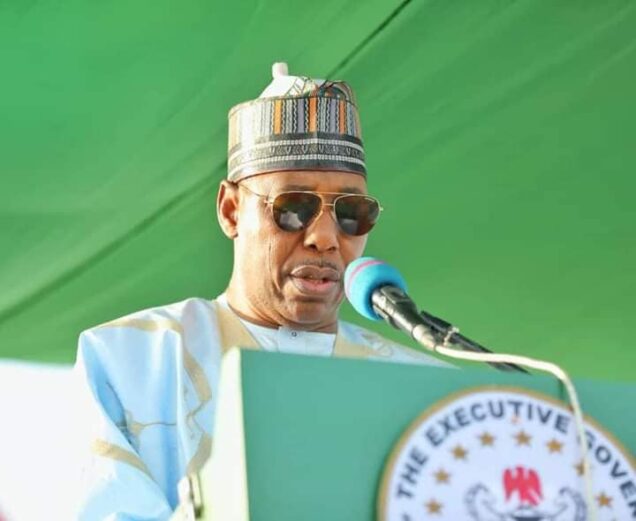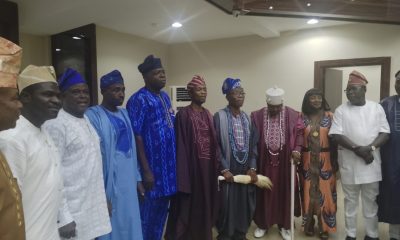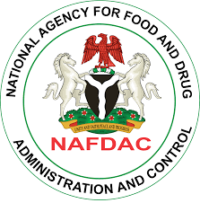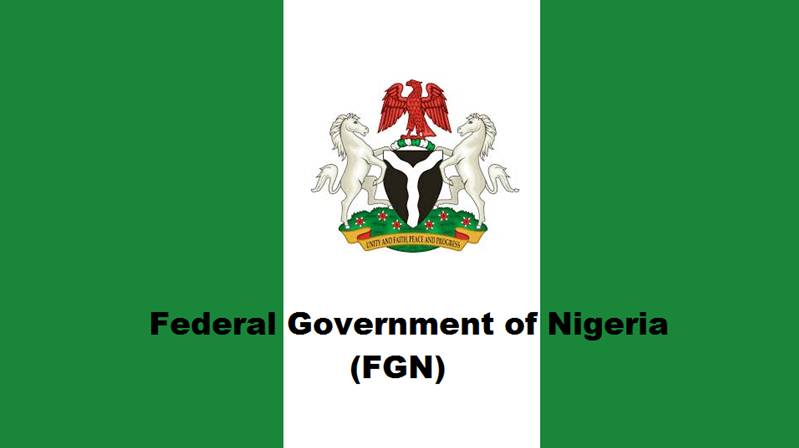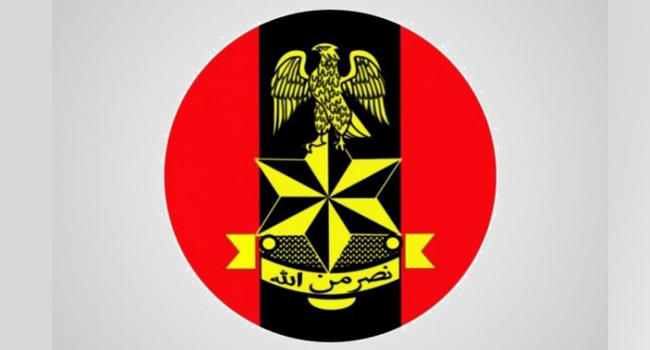Headlines
WHO: Malaria Killed Over 602,000 People in Nigeria, Others in 2021
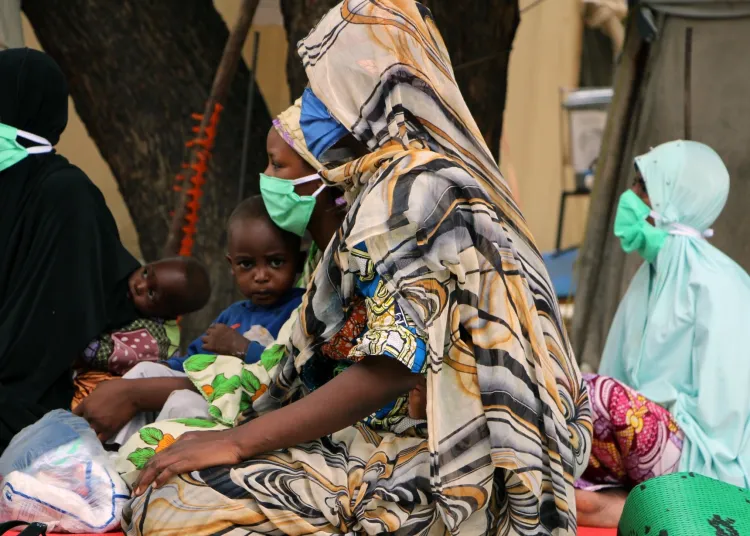
By Derrick Bangura
As the world marked the World Malaria Day on Monday,, the World Health Organisation (WHO) has disclosed that no fewer than 602,000 people died of malaria in Nigeria and other African countries in 2021.
WHO’s Regional Director for Africa, Dr. Matshidiso Moeti, stated this on Monday, in her message to commemorate this year’s World Malaria Day titled: “Harness innovation to reduce the malaria disease burden and save lives.”
She noted that, “Malaria remains a significant public health and development challenge. In the last year, about 95 per cent of the estimated 228 million cases occurred in the WHO/AFRO Region, along with 602,020 reported deaths.
“Six of our countries, the worst-impacted by malaria in the region, are reported to have accounted for up to 55 per cent of cases globally, and for 50 per cent of these deaths.”
The commemoration of World Malaria Day is marked annually to focus global attention on the disease and its devastating impact on families, communities, and societal development, especially in Sub-Saharan Africa.
Moeti said the past year saw significant breakthroughs in malaria prevention and control, in spite of the COVID-19 pandemic.
“Despite some slowing of progress to reduce malaria cases and deaths, and the disruptions to health services caused by COVID-19, we are still much further ahead than we were in 2000. We need to reignite that momentum and build on the recent advances.
“The ultimate goal is to reduce the number of people catching and dying from malaria. This requires a focus on research and on leveraging available evidence to ensure that our targeted interventions are an efficient use of resources, which produce measurable results,” she added.
ExxonMobil Spent over $37.4m on Anti Malaria Programmes in Nigeria in 20 Years
In a related development, American oil and gas giant, ExxonMobil, said it invested more than $37.4 million or over N15 billion in Nigeria-based malaria programmes since 2002 through its humanitarian organ, the ExxonMobil Foundation.
It explained that the fund was spent in cash grants to partners working to develop community-based solutions in Nigeria since 2002.
The international oil company (IOC) said in the last 20 years, the foundation had embarked on funding community education, providing tools for prevention and treatment of the disease and training of health workers, adding that its 2022 grant recipients focused on leveraging the power of sports to engage Nigerian youth.
The foundation in collaboration with ExxonMobil affiliate companies in Nigeria, also announced renewed support for partner organisations committed to ending malaria in Nigeria.
In a statement issued yesterday, it explained that these grants, among other scheduled activities for World Malaria Day, marked the 20th anniversary of ExxonMobil’s support for programmes to reduce the burden of malaria in Nigeria.
Marking its 20th year of malaria fight in Nigeria and in continuation of this legacy, the oil major has, however, announced its 2022 grant recipients.
They included PanAfricare, in conjunction with NBA Power Forward, to foster the development of youth in Nigeria through sports, life skills and malaria education; and Grassroot Soccer, to use the convening power of soccer to increase awareness of malaria and HIV/AIDS among young people across Nigeria through sports curriculum.
Another recipient is Harvard T.H. Chan School of Public Health, aimed to advance scientific knowledge and understanding to advance progress toward the eradication of malaria.
“This World Malaria Day, we mark ExxonMobil’s contributions over the past two decades that have helped equip and strengthen resilience within our communities to fight against malaria.
“Thanks to these efforts, Nigeria is better prepared to continue the progress we have made and work toward a malaria-free future,” Chairman and Managing Director, ExxonMobil affiliate Companies in Nigeria, Mr. Richard Laing, said.
ExxonMobil’s Malaria Initiative works with nonprofit partners and leading global health organizations to advance progress against the disease in malaria-endemic countries by supporting malaria education and awareness, improving access to tools for prevention, diagnosis and treatment, strengthening health infrastructure and advancing research and innovation.
The initiative continues to support malaria prevention and control programs in Nigeria, a country which currently accounts for more than one quarter of the global burden of the disease.
In honor of World Malaria Day, the company said these partners were focused on leveraging the power of sports and media to reach Nigerian youth, through malaria-themed tournaments and creative radio, television and school-based malaria campaigns, among other activities.
Obaseki Canvasses Innovative Financing in Anti-malaria Fight
Meanwhile, Edo State Governor, Mr. Godwin Obaseki, has urged stakeholders to explore innovative approaches to financing efforts and technologies for the prevention and control of malaria disease so as to realise the global zero malaria target.
The governor made the call in commemoration of World Malaria Day, on Monday, to highlight the need for continued investment and sustained political commitment to malaria prevention and control.
Obaseki urged youths to support the global effort to eliminate malaria by developing innovations and technologies for the prevention and treatment of the disease.
Obaseki noted, “As we commemorate this year’s World Malaria Day, we must reinforce efforts and strengthen alliances to reduce the burden of the malaria disease, one of the world’s oldest and deadliest diseases estimated to have claimed over 627, 000 lives in about 85 countries in one year.
“While governments across all levels intensify efforts at improving community-focused malaria interventions, especially in hard-to-reach communities, global stakeholders must strive to bridge the funding gap in achieving a future free of malaria by exploring innovative approaches to stimulate investments in the prevention and control of the disease.
“If the 2030 zero-malaria target must be achieved, we must embrace multi-sectoral collaborations, public-private partnerships and technology-led solutions, leveraging on the innate potential of the youths, to establish a robust malaria control programme, ensuring the prevention, detection and cure of the disease.”
The governor, who noted that his government had embarked on interventions, including the distribution of treated mosquito nets, advocacy and others to ensure that the people are properly equipped to fight malaria, said the state is revamping its health system to bring quality primary healthcare closer to citizens.
He noted that his administration had also ramped up the construction of primary healthcare centres at the ward level across the state, ensuring that each centre is equipped with the right manpower and equipment to sustain the campaign against malaria and other infectious diseases.
Headlines
Noble Ladies Champion Women’s Financial Independence at Grand Inauguration in Abuja

Women from diverse backgrounds across Nigeria and beyond gathered at the Art and Culture Auditorium, Abuja, for the inauguration and convention of the Noble Ladies Association. The event, led by the association’s Founder and “visionary and polished Queen Mother,” Mrs. Margaret Chigozie Mkpuma, was a colourful display of feminine elegance, empowerment, and ambition.
The highly anticipated gathering, attended by over 700 members and counting, reflected the association’s mission to help women realise their potential while shifting mindsets away from dependency and over-glamorization of the ‘white collar job.’ According to the group, progress can be better achieved through innovation and creativity. “When a woman is able to earn and blossom on her own she has no reason to look at herself as a second fiddle,” the association stated.
One of the association’s standout initiatives is its women-only investment platform, which currently offers a minimum entry of ₦100,000 with a return of ₦130,000 over 30 days—an interest rate of 30 percent. Some members invest as much as ₦1 million, enjoying the same return rate. Mrs. Mkpuma explained that the scheme focuses on women because “women bear the greater brunt of poverty” and the platform seeks “to offer equity in the absence of economic equality.”
Education is also central to the Noble Ladies’ mission, regardless of age. Their mantra, “start again from where you stopped,” encourages women to return to school or upgrade their skills at any stage in life. The association believes that financial stability is vital in protecting women from cultural practices that dispossess widows of their late husbands’ assets, while also enabling them to raise morally and socially grounded families.
Founded on the vision of enhancing women’s skills and achieving financial stability, the association rests on a value system that discourages pity and promotes purpose. “You have a purpose and you build on that purpose to achieve great potentials and emancipation,” Mrs. Mkpuma said.
A criminologist by training and entrepreneur by practice, she cautions against idleness while waiting for formal employment. “There are billions in the informal and non-formal sectors waiting to be made,” she said, rejecting the “new normal of begging” and urging people to “be more introspective to find their purpose in life and hold on to it.”
Mrs. Mkpuma’s management style keeps members actively engaged, focusing on vocational skills and training to prepare them for competitive markets. She is exploring “innovative integration of uncommon technologies” and is already in talks with international franchises to invest in Nigeria, with Noble Ladies as first beneficiaries.
The association’s core values include mutual respect, innovation, forward-thinking, equal opportunity, and financial emancipation. With plans underway to establish a secretariat in the heart of Abuja, the group aims to expand its impact.
The event drew high-profile guests, including former Inspector General of Police, Mike Okiro, and a host of VIPs, marking a significant milestone in the association’s drive for women’s empowerment.
Headlines
NEPZA, FCT agree to create world-class FTZ environment

The Nigeria Export Processing Zones Authority (NEPZA) has stepped in to resolve the dispute between the Federal Capital Territory Administration and the Abuja Technology Village (ATV), a licensed Free Trade Zone, over the potential revocation of the zone’s land title.
Dr. Olufemi Ogunyemi, the Managing Director of NEPZA, urged ATV operators and investors to withdraw the lawsuit filed against the FCT administration immediately to facilitate a roundtable negotiation.
Dr. Ogunyemi delivered the charge during a courtesy visit to the Minister of the Federal Capital Territory, Barrister Nyesom Wike, on Thursday in Abuja.
You will recall that the ATV operators responded to the revocation notice issued by the FCT administration with a lawsuit.
Dr. Ogunyemi stated that the continued support for the growth of the Free Trade Zones Scheme would benefit the nation’s economy and the FCT’s development, emphasizing that the FCT administration recognized the scheme’s potential to accelerate industrialisation.
Dr. Ogunyemi, also the Chief Executive Officer of NEPZA, expressed his delight at the steps taken by the FCT minister to expand the economic frontier of the FCT through the proposed Abuja City Walk (ACW) project.
Dr. Ogunyemi further explained that the Authority was preparing to assess all the 63 licensed Free Trade Zones across the country with the view to vetting their functionality and contributions to the nation’s Foreign Direct Investment and export drives.
“I have come to discuss with His Excellency, the Minister of the Federal Capital Territory on the importance of supporting the ATV to succeed while also promoting the development of the Abuja City Walk project. We must work together to achieve this for the good of our nation,” he said.
On his part, the FCT Minister reiterated his unflinching determination to work towards President Bola Ahmed Tinubu’s Renewed Hope Agenda by bringing FDI to the FCT.
“We must fulfil Mr. President’s promises regarding industrialization, trade, and investment. In this context, the FCT will collaborate with NEPZA to review the future of ATV, a zone that was sponsored and supported by the FCT administration,” Wike said.
Barrister Wike also said that efforts were underway to fast-track the industrialisation process of the territory with the construction of the Abuja City Walk.
The minister further said the Abuja City Walk project was planned to cover over 200 hectares in the Abuja Technology Village corridor along Airport Road.
According to him, the business ecosystem aimed to create a lively, mixed-use urban center with residential, commercial, retail, hospitality, medical, and institutional facilities.
He added that the ACW would turn out to be a high-definition and world-class project that would give this administration’s Renewed Hope Agenda true meaning in the North-Central Region of the country.
Barrister Wike also indicated his continued pursuit of land and property owners who failed to fulfil their obligations to the FCT in his determination to develop the territory.
Headlines
Benue IDPs block highway, demand return to ancestral homes

Vehicular movement along the Yelwata axis of the Benue–Nasarawa highway was brought to a standstill on Wednesday as Internally Displaced Persons, IDPs, staged a protest, demanding immediate return to their ancestral homes.
The protesters, believed to be victims of persistent attacks by suspected herdsmen, blocked both lanes of the busy highway for several hours, chanting “We want to go back home”.
The protest caused disruption, leaving hundreds of motorists and passengers stranded.
Eyewitnesses said the displaced persons, many of whom have spent years in overcrowded IDP camps, are expressing deep frustration over the government’s delay in restoring security to their communities.
“We have suffered enough. We want to return to our homes and farms,” one of the protesters told reporters at the scene.
Security personnel were reportedly deployed to monitor the situation and prevent any escalation, though tensions remained high as of press time.
Efforts to reach the Benue State Emergency Management Agency, SEMA, and other relevant authorities for comment were unsuccessful.
-

 Headlines4 years ago
Headlines4 years agoFacebook, Instagram Temporarily Allow Posts on Ukraine War Calling for Violence Against Invading Russians or Putin’s Death
-

 Headlines4 years ago
Headlines4 years agoNigeria, Other West African Countries Facing Worst Food Crisis in 10 Years, Aid Groups Say
-

 Foreign4 years ago
Foreign4 years agoNew York Consulate installs machines for 10-year passport
-

 News1 year ago
News1 year agoZero Trust Architecture in a Remote World: Securing the New Normal
-

 Entertainment3 years ago
Entertainment3 years agoPhyna emerges winner of Big Brother Naija Season 7
-

 Headlines2 years ago
Headlines2 years agoNigeria Customs modernisation project to check extortion of traders
-

 Entertainment2 years ago
Entertainment2 years agoMovie download platform, Netnaija, announces closure
-

 Economy2 years ago
Economy2 years agoWe generated N30.2 bn revenue in three months – Kano NCS Comptroller



